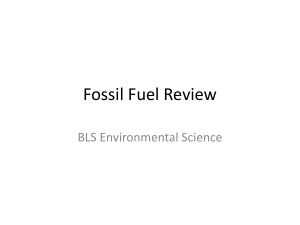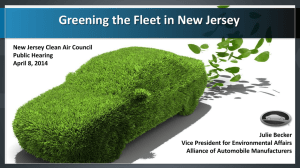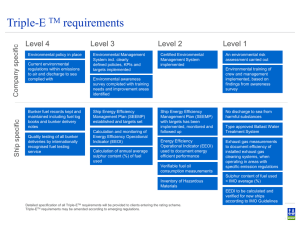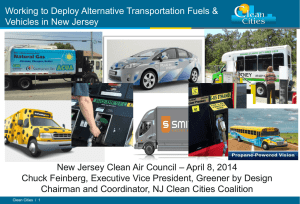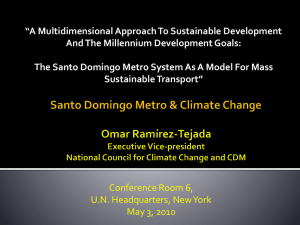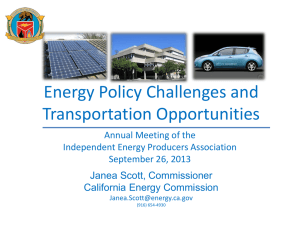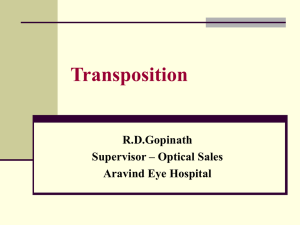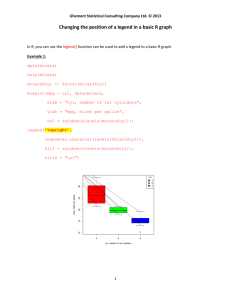Fuel Efficient Fleets
advertisement
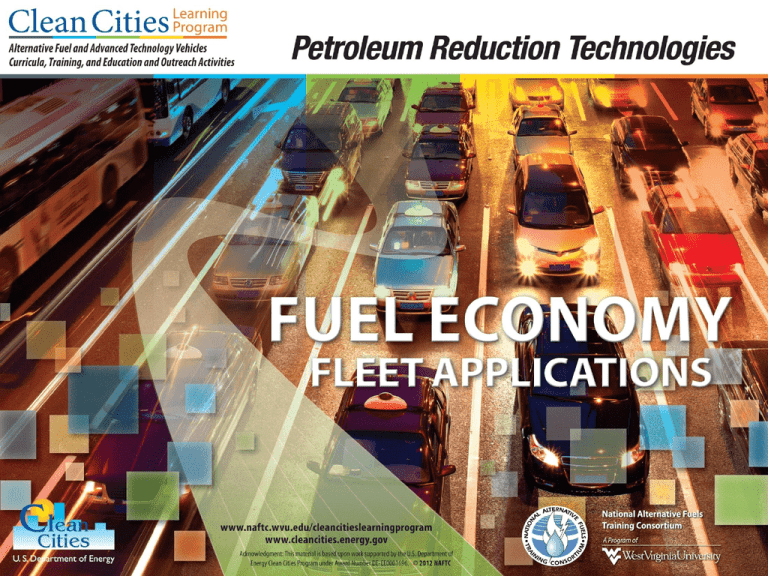
1 Objectives Explain how to implement green fleets Learn about incentives for converting to fuel efficient fleets Learn about the availability and cost of fuel efficient strategies and vehicles Identify the advantages of fuel economy improvements Understand how fuel efficient vehicles perform compared to conventional vehicles 2 Greening of Fleets Why use green fleets? Reduce operating costs Reduce greenhouse gas emissions Improve corporate image 3 How to Implement Green Fleets Get buy-in Create long-term objectives Avoid setting reduction goals in absolute numbers Anticipate obstacles Move slowly Improve vehicle use Track and report progress 4 Fuel Efficient Fleets A measure of how efficiently a vehicle uses fuel Miles per gallon (MPG) Specific tests used to determine ratings Affected by vehicle design and operation EPA sets emissions and fuel economy standards for all vehicles 5 CAFE regulations Increased standards put in place by the Obama administration Engine and vehicle design Road load equation shows where power is consumed Fuel consumption increases as engine power increases Power for accessories and auxiliary equipment 6 Incentives for Implementing Fuel Efficiency Incentives Partnership initiatives and pooled resources Financial subsidiaries Informational tools Initial cost vs. federal and state incentives American Recovery and Reinvestment Act (ARRA) Clean Cities Program 7 Tax Incentives Incentives for hybrid and electric vehicle purchases Heavy-duty fleet incentives for reduced idling Availability and regulations are constantly changing Gas guzzler tax 8 Combined fuel economy of: Amount at least 22.5 MPG No tax at least 21.5, but less than 22.5 MPG $1000 at least 20.5, but less than 21.5 MPG $1300 at least 19.5, but less than 20.5 MPG $1700 at least 18.5, but less than 19.5 MPG $2100 at least 17.5, but less than 18.5 MPG $2600 at least 16.5, but less than 17.5 MPG $3000 at least 15.5, but less than 16.5 MPG $3700 at least 14.5, but less than 15.5 MPG $4500 at least 13.5, but less than 14.5 MPG $5400 at least 12.5, but less than 13.5 MPG $6400 less than 12.5 MPG $7700 Figure 1: Gas guzzler tax based on fuel economy. Source: fueleconomy.gov. 9 Federal Grant Funding Federal government = largest grant provider U.S. Department of Energy (DOE) U.S. Department of Transportation (DOT) Environmental Protection Agency (EPA) U.S. Department of Agriculture (USDA) 10 State Grant Funding State Energy Office (SEO) National Association of State Energy Officials directory Alternative Fuels Data Center map To find state-specific information, visit www.afdc.energy.gov/afdc/laws/state 11 Incentives for Fuel Efficient Vehicle Production Research of HEVs and FCEVs Advanced Technology Vehicle (ATV) manufacturing incentive Incentives help make research and production more economical 12 Fuel Economy Availability and Cost Available in light-, medium-, and heavyduty vehicles Technologies combined with hybrid systems for light- to heavy-duty vehicles Strategies applied to light-and heavyduty vehicles/fleets, both old and new 13 EPA Class Vehicle Description Fuel Economy Combined Honda CR-Z Two-Seaters 4 cyl, 1.5 L, Automatic (AV-S7), HEV, Regular 37 Minicompacts Scion iQ 4 cyl, 1.3 L, Automatic (CVT), Regular 37 Subcompacts Mitsubishi i-MiEV A-1, 66 kW DCPM, Electric Vehicle 112‡ Compacts Chevrolet Volt 4 cyl, 1.4 L, Automatic (AV), Plug-in Hybrid 60§ Midsize Nissan Leaf A-1, Electric Vehicle 99‡ Large Hyundai Sonata 4 cyl, 2.4 L, Manual (6), Regular Hyundai Sonata 4 cyl, 2.4 L, Automatic (6), Regular 28 Audi A3 4 cyl, 2.0 L, Automatic (S6), Diesel 34 Volkswagen Jetta SportWagen 4 cyl, 2.0 L, Manual (6), Diesel 34 Toyota Prius v 4 cyl, 1.8 L, Automatic (CVT), HEV, Regular 42 Small Station Wagons Midsize Station Wagons Figure 2: Most fuel efficient passenger cars for 2012 model year. Source: EPA. 14 EPA Class Vehicle Description Fuel Economy Combined Toyota Tacoma 2WD Small Pickup Trucks 22 4 cyl, 2.7 L, Manual (5), Regular Gasoline Chevrolet Silverado 15 Hybrid 2WD 8 cyl, 6.0 L, Automatic (CVT), Regular Gasoline Chevrolet Silverado 15 Hybrid 4WD 8 cyl, 6.0 L, Automatic (CVT), Regular Gasoline 21 GMC Sierra 15 Hybrid 2WD 8 cyl, 6.0 L, Automatic (CVT), Regular Gasoline GMC Sierra 15 Hybrid 4WD 8 cyl, 6.0 L, Automatic (CVT), Regular Gasoline 21 Sport Utility Vehicles Ford Escape Hybrid FWD 4 cyl, 2.5 L, Automatic (CVT), Regular Gasoline 32 Minivans Mazda 5 4 cyl, 2.5 L, Automatic (S5), Regular Gasoline Mazda 5 4 cyl, 2.5 L, Manual (6), Regular Gasoline 24 Chevrolet Express 1500 2WD FFV 8 cyl, 5.3 L, Automatic (4), Regular Gasoline Chevrolet Express 1500 AWD FFV 8 cyl, 5.3 L, Automatic (4), Regular Gasoline 14† Ford E150 Wagon FFV 8 cyl, 4.6 L, Automatic (4), Regular Gasoline 14† Azure Dynamics Transit Connect Electric Van A-1, 52 kWAC, Electric Azure Dynamics Transit Connect Electric Wagon A-1, 52 kWAC, Electric 62‡ Standard Pickup Trucks Passenger Vans Special Purpose Vehicles Figure 3: Most fuel efficient trucks and SUVs for 2012 model year. Source: EPA. 15 Cost Fuel efficient vehicles/strategies directly affect fleet costs Payback period Generally no monetary commitment is needed for strategies alone 16 Fuel Economy Advantages Immediate savings from implementing strategies Reduced emissions and carbon footprint Reduces U.S. dependence on foreign oil 17 Things to Consider New vehicles have a higher capital cost, but 2013 window stickers may help to better examine payback periods Some strategies such as load reductions are not possible for heavy-duty long haul applications Fleet operators may require monitoring to ensure that fuel efficient strategies are utilized 18 Fuel Economy Strategies Slow down Coasting Cruise control Tire Pressure Weight Air conditioning Rerouting Maintenance Transmission Motor oil Figure 4 (left): Cruise control button and controls. Source: fueleconomy.gov. Figure 5 (right): Extra weight can decrease vehicle fuel economy. Source: fueleconomy.gov. 19 Fuel Economy Label Standard for 2013 vehicles Predicted annual fuel cost, GHG rating, smog rating Directs buyers to fueleconomy.gov QR code integration 20 Figure 6: New EPA window label for consumers. Source: EPA. 21 Fuel Economy Performance Fuel efficient vehicles have similar or better performance than conventional vehicles New engine technologies 22 Test Your Knowledge 1. 2. 3. 4. True or False: Fuel economy savings can only be accomplished by the purchase of new fleet vehicles. True or False: The new 2013 EPA window stickers help buyers understand the operating fuel costs and fuel savings of new vehicles. The Corporate Average Fuel Economy standard was recently raised by President Obama to ________ MPG by the year 2025. True or False: Hybrid electric vehicles offer improved vehicle fuel economy and are available for both light-duty and heavy-duty fleets. 23


